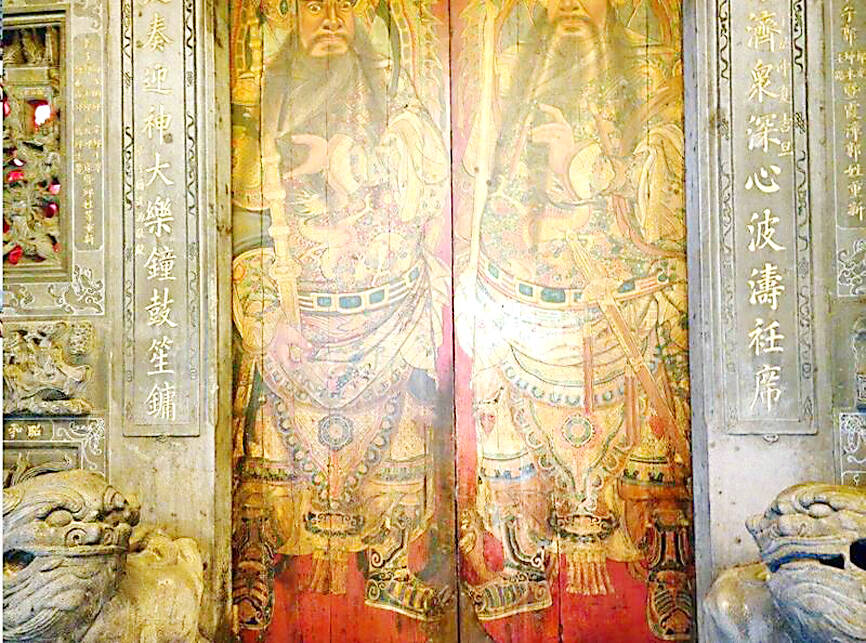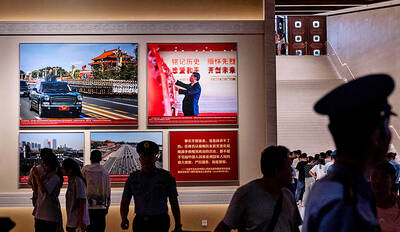A Spanish national was arrested early yesterday on suspicion of using lacquer thinner to damage a painting on the doors of the historic Cixian Temple (慈諴宮) in Taipei’s Shilin District (士林), local police said.
Taipei’s Wenlin Police Station said it received a report at about 2am yesterday about a possible act of vandalism at the temple at the Shilin Night Market (士林夜市).
Upon arriving at the scene, officers found a man scrubbing the temple’s painted wooden doors with lacquer thinner and degreaser, causing the paint to smear and turn white.

Photo courtesy of Taipei police
The suspect, identified as a 53-year-old Spaniard, told police that after drinking at home, he had gone out and noticed the poor condition of the doors, so he had brought supplies to clean them.
Although the man has not been identified by name, he is said to be an artist who has previously helped restore paintings and eaves at temples across the nation.
Wenlin Police Station Chief Wang Sheng-chieh (王聖傑) told reporters that the suspect had damaged the historic temple “for no reason” and that “there need to be legal consequences.”
He said that Article 103 of the Cultural Heritage Preservation Act (文化資產保存法) states that damaging a cultural artifact is punishable by six months to five years in prison and a fine of NT$500,000 to NT$20 million (US$15,662 to US$626,488.).
The Cixian Temple, which is dedicated to the sea goddess Matsu, was founded in 1796 and moved to its current location in 1864, the Ministry of the Interior said.
The artwork on the damaged temple doors was painted by Tainan-born artist Chen Yu-feng (陳玉峰) in 1960.

Three batches of banana sauce imported from the Philippines were intercepted at the border after they were found to contain the banned industrial dye Orange G, the Food and Drug Administration (FDA) said yesterday. From today through Sept. 2 next year, all seasoning sauces from the Philippines are to be subject to the FDA’s strictest border inspection, meaning 100 percent testing for illegal dyes before entry is allowed, it said in a statement. Orange G is an industrial coloring agent that is not permitted for food use in Taiwan or internationally, said Cheng Wei-chih (鄭維智), head of the FDA’s Northern Center for

The Chinese military has built landing bridge ships designed to expand its amphibious options for a potential assault on Taiwan, but their combat effectiveness is limited due to their high vulnerability, a defense expert said in an analysis published on Monday. Shen Ming-shih (沈明室), a research fellow at the Institute for National Defense and Security Research, said that the deployment of such vessels as part of the Chinese People’s Liberation Army (PLA) Navy’s East Sea Fleet signals a strong focus on Taiwan. However, the ships are highly vulnerable to precision strikes, which means they could be destroyed before they achieve their intended

About 4.2 million tourist arrivals were recorded in the first half of this year, a 10 percent increase from the same period last year, the Tourism Administration said yesterday. The growth continues to be consistent, with the fourth quarter of this year expected to be the peak in Taiwan, the agency said, adding that it plans to promote Taiwan overseas via partnerships and major events. From January to June, 9.14 million international departures were recorded from Taiwan, an 11 percent increase from the same period last year, with 3.3 million headed for Japan, 1.52 million for China and 832,962 to South Korea,

REWRITING HISTORY: China has been advocating a ‘correct’ interpretation of the victory over Japan that brings the CCP’s contributions to the forefront, an expert said An elderly Chinese war veteran’s shin still bears the mark of a bullet wound he sustained when fighting the Japanese as a teenager, a year before the end of World War II. Eighty years on, Li Jinshui’s scar remains as testimony to the bravery of Chinese troops in a conflict that killed millions of their people. However, the story behind China’s overthrow of the brutal Japanese occupation is deeply contested. Historians broadly agree that credit for victory lies primarily with the Chinese Nationalist Party (KMT)-led Republic of China (ROC) Army. Its leader, Chiang Kai-shek (蔣介石), fled to Taiwan in 1949 after losing a